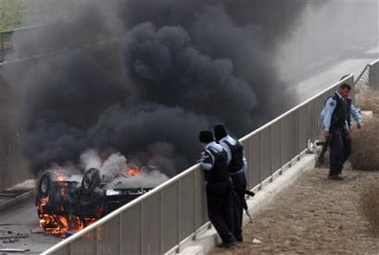|
US envoy warns Iraq to unify government
(AP)
Updated: 2006-02-21 09:01
BAGHDAD, Iraq - The US ambassador delivered a blunt warning to Iraqi leaders
Monday that they risk losing American support unless they establish a national
unity government with the police and the army out of the hands of religious
parties.
Ambassador Zalmay Khalilzad delivered the warning as another 24 people,
including an American soldier, died in a string of bombings, underscoring the
need for the country to establish a government capable of winning the trust of
all communities and ending the violence.

Iraqi police
observe the vehicle that caught in fire following an explosion caused by a
roadside bomb, in Baghdad, Monday, Feb. 20, 2006. One SUV and a civilian
car were damaged in the blast and three civilians were injured. (AP
Photo/Samir Mizban) |
Such a government is also essential to the US strategy for handing over
security to Iraqi soldiers and police so the 138,000 US troops can go home. But
talks among Iraqi parties that won parliament seats in the Dec. 15 election have
stalled over deep divisions among Shiites, Sunni Arabs and Kurds.
During a rare news conference, Khalilzad said division among the country's
sectarian and ethnic communities was "the fundamental problem in Iraq," fueling
the Sunni Arab-dominated insurgency and the wave of reprisal killings.
"To overcome this there is a need for a government of national unity," which
"is the difference between what exists now and the next government," he said.
The outgoing government is dominated by Shiites and Kurds.
Khalilzad said Iraq's next Cabinet ministers, particularly those heading the
Interior and Defense ministries, "have to be people who are nonsectarian,
broadly acceptable and who are not tied to militias" run by political parties.
Otherwise, he warned that "Iraq faces the risk of warlordism that Afghanistan
went through for a period." Khalilzad was born in Afghanistan and served as U.S.
envoy there.
To underscore his remarks, Khalilzad reminded the Iraqis that the United
States has spent billions to build up Iraq's police and army and said "we are
not going to invest the resources of the American people and build forces that
are run by people who are sectarian" and tied to the militias — some of which
the ambassador said received "arms and training" from Iran.
British Foreign Secretary Jack Straw, who arrived in Baghdad late Monday, was
expected to reinforce Khalilzad's message during meetings with Prime Minister
Ibrahim al-Jaafari and other Iraqi leaders.
There was no response from al-Jaafari's government to Khalilzad's warning,
but a prominent Shiite politician, Jalaladin al-Saghir, said the comments were
"unacceptable" and constituted interference in the affairs of a sovereign state.
"We all want a national unity government and the U.S. ambassador is no more
eager than we are to reach such a government," al-Saghir told The Associated
Press. "It is the Americans who push toward sectarianism by their ever-changing
points of view. We feel uneasy about some of the U.S. agenda."
Al-Saghir said the Americans had installed former members of Saddam Hussein's
Baath party in the Interior and Defense ministries and "Shiites are upset about
this."
In Najaf, al-Jaafari said formation of the government was more complicated
"because this time the Arab Sunnis are participating in the political process."
In the latest bloodshed, an American soldier was killed Monday by a roadside
bomb near Karbala, a Shiite shrine city about 50 miles southwest of Baghdad. The
death brought to at least 2,274 the number of members of the U.S. military to
have died since the beginning of the Iraq war in March 2003, according to an
Associated Press count.
A suicide bomber detonated an explosives belt on a bus Monday in Baghdad's
Shiite district of Kazimiyah, killing 12 people and wounding 15, police said.
Earlier, a bomb exploded next to tea stalls near Liberation Square in central
Baghdad, killing at least four day laborers and wounding 14, police said.
In Mosul, 225 miles northwest of Baghdad, a suicide attacker blew himself up
in a restaurant packed with policemen eating breakfast, killing at least five
people and wounding 21, including 10 policemen, officials said.
The Shura Council for Mujahedeen in Iraq claimed responsibility in a
statement posted on an Islamic Web site, saying one of the "lions of monotheism"
attacked the restaurant because it was "frequented by apostate policemen."
Two more civilians died when a car bomb exploded in Madain, southeast of
Baghdad, police said. Eleven people, including three women, were wounded.
A coalition of Shiite religious parties won 130 of the 275 seats in the new
parliament. Although they have agreed in principle to a unity government, Shiite
leaders insist their strong showing in the election gives them the democratic
right to control key levers of power.
A Kurdish alliance won 53 seats and two Sunni Arab blocs together took 55
seats — a major increase over Sunni representation in the outgoing parliament.
Iraqis have until mid-May to form a new government, but U.S. and Iraqi officials
warn the process could take longer because of political differences.
Mistrust and bitterness among the communities run deep. Much of it is rooted
in oppression of Shiites and Kurds by Saddam's Sunni-dominated regime and fanned
by the current insurgency. Shiites and Kurds dominate the security services and
most of the insurgents are Sunni Arabs.
Several Shiite parties are believed to control armed militias, some of which
date back to the Iran-Iraq war of the 1980s when many Iraqi Shiites fled to
Shiite-dominated Iran. Kurds maintain the biggest armed force — the peshmerga —
which they maintain is the legitimate security force of their autonomous
government in the north.
Shiites demand that Sunni Arab parties work actively against the insurgency.
Sunnis insist on drawing a difference between "legitimate resistance" to foreign
occupation and terrorism that targets civilians.
Kurds zealously guard the self-rule they have enjoyed since 1991, and many of
them want to expand their autonomous region to oil centers around Kirkuk,
claimed by Kurds, Arabs and Turkomen.
|